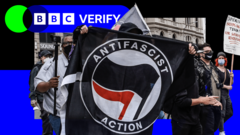What Is Antifa and Why Is Trump Going After It?

Published: 2025-09-18 17:50:14 | Category: wales
In a recent statement, US President Donald Trump announced plans to designate Antifa as a "major terrorist organisation," aiming to intensify his efforts against what he describes as "radical left" movements. Antifa, a loosely affiliated group opposing far-right ideologies, has faced scrutiny for its controversial tactics and has often been a focal point in political discourse. However, experts highlight significant challenges in implementing such a designation, given the group's lack of formal structure and the implications for free speech rights.
Last updated: 02 October 2023 (BST)
Key Takeaways
- Trump's designation of Antifa as a terrorist organisation raises legal and constitutional concerns.
- Antifa is a decentralised movement with no formal leadership or membership.
- Challenges exist in proving Antifa's actions fit the criteria for terrorism under US law.
- Political violence in the US is complex, with studies indicating right-wing extremism is more prevalent.
- The implications of Trump's statement could lead to broader government overreach regarding free speech rights.
Understanding Antifa: Origins and Ideology
Antifa, short for anti-fascist, originated from a German movement in the 1930s. The term encompasses a range of leftist activists who oppose fascism, racism, and far-right ideologies. While the movement has existed in various forms for decades in the US, it gained significant attention and notoriety following the 2016 presidential election and the violent clashes in Charlottesville in 2017.
The absence of formal organisation makes Antifa unique. It consists of various groups and individuals who unite under a shared anti-fascist ideology, characterised by a diverse array of beliefs, including anarchism, socialism, and radical leftism. Many activists advocate for anti-government, anti-capitalist, pro-LGBTQ, and pro-immigration policies.
Why Trump Targets Antifa
Trump's recent comments regarding Antifa come in the wake of the tragic killing of conservative activist Charlie Kirk. The president labelled Antifa a "sick, dangerous, radical left disaster" and expressed intentions to investigate the group thoroughly. This aligns with his broader narrative against left-wing extremism, which he claims poses a significant threat to public safety and societal stability.
Historically, Trump has opposed Antifa, viewing it as emblematic of the radical left that he accuses of undermining American values. His prior attempts to label Antifa as a terrorist organisation in 2020 were met with legal challenges and ultimately did not materialise. This latest move serves as part of a renewed effort to galvanise his base ahead of upcoming elections, as he continues to frame the narrative of political violence as predominantly left-wing.
Legal Considerations and Challenges
While Trump has vowed to designate Antifa as a terrorist organisation, the legal framework for such a classification remains ambiguous. In the US, the government can designate foreign organisations as Foreign Terrorist Organisations (FTOs), but this requires the group to be based outside the country. Antifa's domestic nature complicates the application of such measures.
Legal experts have raised concerns that attempting to label Antifa as a terrorist group could infringe upon First Amendment rights, which protect the freedom of association and speech. Professor David Schanzer from Duke University emphasised that the president's designation does not override constitutional protections, stating, "Unless they have violated the law, the government cannot interfere with the operations of groups." This suggests that without tangible evidence of criminal activity, any designation may lack legal standing.
Potential for Government Overreach
Experts warn that the vague nature of Antifa’s structure could lead to overreach by authorities. Brad Evans, a scholar of political violence, noted that without clear definitions, anyone perceived as associated with Antifa could be subject to scrutiny and potential legal consequences. This raises concerns about civil liberties and the possibility of unjust targeting based on mere suspicion.
Furthermore, legal experts have questioned the necessity of a new designation when existing laws could address violent behaviour more effectively. Critics argue that the focus should be on prosecuting individuals who commit crimes rather than labelling entire movements as terrorist organisations.
The Political Landscape of Violence
The conversation surrounding Antifa also intersects with broader trends in political violence across the US. Recent data suggests that politically motivated attacks are often attributed to right-wing extremists, with several studies indicating that far-right ideologies are linked to a greater number of violent incidents compared to leftist movements. This raises questions about the narrative being propagated by some right-wing figures, including Trump.
Notably, the US Department of Justice recently removed a study that concluded far-right extremism constitutes the most significant threat in terms of politically motivated violence. Critics have questioned the removal, citing a lack of transparency and potential motivations behind the decision.
Impacts of Political Rhetoric
Political rhetoric that assigns blame for violence to specific groups can have unintended consequences. According to Professor Robert Pape from the University of Chicago, when leaders label a particular ideology as the source of violence, it often leads to increased support for that same violence, rather than a reduction. This cyclical pattern poses a challenge for addressing the root causes of political violence in the country.
As the political landscape continues to evolve, the potential ramifications of Trump's statements regarding Antifa and the broader implications for free speech and civil liberties remain critical areas for discussion.
Conclusion
The ongoing debate surrounding Antifa and its designation as a terrorist organisation highlights the complexities of political movements and the challenges they pose to legal frameworks in the US. As Trump continues to target left-wing groups, the potential for overreach and infringement on civil liberties raises pressing concerns about the balance between national security and individual rights. Understanding this dynamic is crucial as the nation navigates an increasingly polarised political climate.
What will be the long-term effects of designating groups like Antifa in the current political environment? How will this influence future activism and political discourse? #Antifa #PoliticalViolence #FreeSpeech
FAQs
What is Antifa?
Antifa, short for anti-fascist, is a loosely affiliated group of activists who oppose far-right ideologies and racism. The movement is characterised by its decentralised structure and diverse beliefs.
Why is Trump designating Antifa as a terrorist organisation?
Trump aims to target what he perceives as radical left movements following the killing of conservative activist Charlie Kirk, claiming that Antifa represents a significant threat to public safety.
What are the legal challenges to designating Antifa as a terrorist group?
The lack of a formal organisation, along with First Amendment protections regarding free speech and association, complicates any potential legal designation of Antifa as a terrorist organisation.
How does Antifa differ from other left-wing groups?
Antifa is distinguished by its willingness to engage in direct action and, in some cases, violence to oppose far-right movements, which some activists justify as self-defence.
What are the implications of designating a group as a terrorist organisation?
Designation can lead to legal consequences, including the removal of members from the US, as well as the potential for government surveillance and funding seizures, but applying this to a domestic group like Antifa is legally complex.


